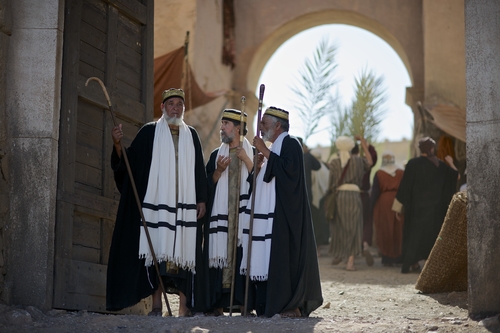Das Gamaliel-Prinzip
Und jetzt sage ich euch: Lasst von diesen Menschen ab und lasst sie gewähren! Denn wenn dieses Vorhaben oder dieses Werk von Menschen ist, so wird es zunichtewerden; ist es aber von Gott, so könnt ihr es nicht vernichten. Dass ihr nicht etwa als solche erfunden werdet, die gegen Gott kämpfen! (Apostelgeschichte 5,38-39)
Die Mitglieder des Hohen Rats waren wütend. Petrus und die übrigen Apostel bezogen mutig Stellung und sagten diesen wichtigen Männern, dass sie nicht von dem abrücken würden, was Gott ihnen zu sagen und zu tun aufgetragen hatte. In Apostelgeschichte 5,33 lesen wir, dass die Männer des Rates so wütend waren, dass sie diese Anführer der noch jungen christlichen Bewegung töten wollten.

Dann ergriff einer der angesehensten Männer im Saal das Wort. Sein Name war Gamaliel, und er war so angesehen, dass sie ihm den Titel Rabbi gaben, was “unser Lehrer” bedeutet. Gamaliel war der Enkel des verehrten Rabbiners Hillel, des Begründers der strengsten Schule der Schriftauslegung jener Zeit.
Der Hohe Rat hatte einen Mord im Sinn, als Gamaliel seine Stimme erhob, und der angesehene Rabbiner begann mit einer Geschichtsstunde. Er erinnerte sie alle an zwei Revolutionäre, die Israel vor gar nicht allzu langer Zeit in die Irre führen wollten und beide scheiterten. Dann wies er auf die Christen hin: Denn wenn dieses Vorhaben oder dieses Werk von Menschen ist, so wird es zunichtewerden; ist es aber von Gott, so könnt ihr es nicht vernichten. Dass ihr nicht etwa als solche erfunden werdet, die gegen Gott kämpfen.
Seit Gamaliel diese Worte sagte, halten manche sie für weise und sagen, dass das “Gamaliel-Prinzip” uns leiten sollte. Ich bin da ganz anderer Meinung. Sicherlich gibt es Zeiten, in denen “abwarten und sehen, ob dies von Gott ist oder nicht” ein guter Rat ist, aber nicht, wenn es darum geht, zu entscheiden, ob eine Religion oder eine geistliche Bewegung richtig oder falsch ist.
Gamaliel sprach für sich selbst und nicht für Gott. Es gibt viele Religionen oder geistliche Bewegungen, die in den Augen der Menschen erfolgreich sein mögen, aber sie widersprechen Gottes Wahrheit. Erfolg ist nicht der ultimative Maßstab für Wahrheit. Es gibt Religionen, die seit Hunderten von Jahren existieren und Millionen von Anhängern haben, und die falsch sind.
Gamaliel war wirklich ein Zaungast. Er sprach so, als ob sie abwarten sollten, ob Jesus und die Apostel wirklich von Gott waren. Das klang weise und vielleicht sogar geistlich, aber er lehnte damit die Beweise ab, die er direkt vor Augen hatte.
Aber welches Zeugnis, das größer war, als Jesu Auferstehung und die Wunder der Apostel, brauchte er? Gamaliel nahm eine Haltung ein, die man mit „Abwarten und Tee trinken“ beschreiben könnte, obwohl es genügend Beweise dafür gab, dass Jesus Christus derjenige war, für den er sich ausgab, dass Jesus von den Toten auferstanden war und dass die Apostel von Gott gesandt waren, um diese Botschaft zu verbreiten.
Gamaliel schlug den Test der Zeit vor, und das ist ein wichtiger Test. Aber noch wichtiger als der Test der Zeit ist der Test der Ewigkeit. Warte nicht ab, wenn Gott Dir bereits den Beweis dafür gegeben hat, wer Jesus ist und was er für Dich getan hat.







